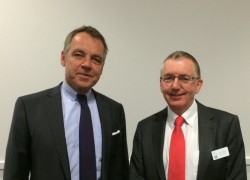 It’s only a matter of months since Christoph Mueller took up the reigns as CEO of Malaysia Airlines (MAS) and he’s wasted no time getting to work on the many challenges. I talked to him at the recent World Travel Market.
It’s only a matter of months since Christoph Mueller took up the reigns as CEO of Malaysia Airlines (MAS) and he’s wasted no time getting to work on the many challenges. I talked to him at the recent World Travel Market.
2014 was a terrible year for MAS with the loss of two of its aircraft. Mueller acknowledges that this has touched the workforce dramatically at a personal level and on top of this he’s had to administer some tough medicine with 6000 staff losing their posts. This should have been done better he says, job losses took too long, causing uncertainty and anxiety among staff.
Given the urgency of the MAS turnaround situation, certain prerequisites in leadership style are required, explains Mueller. A degree of autocracy (little time to consult with the team), an ability to take quick decisions on the 80/20 principal, against considerable uncertainty are all essential.
Costs are inevitably the key area of attention. Along with manpower, a myriad of expense allowances are being rationalised, as is an overly diverse supplier base. MAS finds itself in a highly competitive market with significant overcapacity in the Asia Pacific market driving low prices to deliver “consumer heaven” but “a nightmare for airlines”. Mueller’s aim is therefore to have one of the lowest unit costs in Asia making MAS fit enough to take on even the region’s leading LCC’s. Competition is a fact of life & he is unphased by the Gulf carriers or ongoing complaints about their activities. Indeed he’s just concluded a broad code share agreement with Emirates. Referencing the complaints, he draws comparison with the glory days of US carrier Pan Am with its global network & reminisces on plans, during his time with Lufthansa, to use Sharjah in the UAE as a key cargo hub.
Reshaping the network is a cornerstone of his turnaround strategy, it’s design dates back 15 years, focussed too much on low fare transfer traffic, particularly that in the highly contested “Kangaroo route” between Australia and Europe. Surprisingly perhaps, Mueller says he didn’t find a network that was shaped purely for political need, if anything it didn’t even match Malaysia’s key trade flows. London will be the only direct European destination remaining whilst several notable global cities will be confined to history. According to Mueller the fleet is well suited to the task in hand, London consumes 4 of the 6 Airbus A380s maintaining a double daily service, with spare capacity being offered in the charter market (not ideal admittedly). The Boeing 777 is, of course, a versatile long haul work horse.
He sees other reasons to be optimistic. Malaysia’s GDP is growing at 5% per annum; per capita incomes are the second highest in the region. In a part of the world where many competing airports are capacity strapped, Malaysian’s home airport, Kuala Lumpur International with 3 runways capable of independent use, has room for growth. “The sharpest strategic differentiator” over the medium term says Mueller. The one World Alliance membership is “under leveraged” and along with the new Emirates code share, Mueller is on the lookout for other partnership or joint venture opportunities. No question, the journey on which MAS is embarking on is a challenging one but Christoph Mueller, industry trouble shooter, looks to be well up for the fight.
Watch my interview with CEO Christoph Mueller at WTM 2015.
Leave a Reply